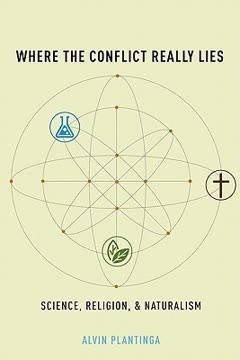Key Takeaways
1. Science and Religion Have More Concord Than Conflict
"My overall claim in this book: there is superficial conflict but deep concord between science and theistic religion, but superficial concord and deep conflict between science and naturalism."
Misunderstood Relationship. The traditional narrative of science versus religion is fundamentally flawed. Rather than being inherently opposed, scientific inquiry and religious belief can actually complement each other, with theology providing foundational assumptions that make scientific exploration possible.
Historical Context. Contrary to popular belief, modern science originated within a Christian intellectual framework. Many pioneering scientists were deeply religious individuals who saw their scientific work as a way of understanding God's creation. The philosophical and theological foundations of Western civilization provided the necessary intellectual soil for scientific methodology to emerge and flourish.
Philosophical Alignment. The belief in a rational, ordered universe created by an intelligent deity actually encourages scientific investigation. The assumption that the world is comprehensible and follows consistent laws is more naturally derived from theistic worldviews than from purely materialistic perspectives.
2. Evolution Does Not Inherently Contradict Christian Belief
"The scientific theory of evolution as such is entirely compatible with Christian belief; what is incompatible with it is the idea that evolution, natural selection, is unguided."
Separating Science from Metaphysics. The scientific theory of evolution describes a mechanism of biological development, but does not inherently require a metaphysical commitment to unguided or purposeless change. Christians can perfectly reasonably accept evolutionary mechanisms as potentially part of God's creative process.
Theological Flexibility. Many Christian theologians and scientists argue that evolutionary processes could be understood as divinely directed, with God potentially guiding mutations, preserving certain populations, and orchestrating the overall developmental trajectory of life.
Philosophical Nuance. The key distinction is between the scientific description of evolutionary mechanisms and the philosophical claim that these mechanisms are purely random and devoid of purpose. The scientific data itself makes no such claim, which is instead a metaphysical add-on.
3. Divine Action and Miracles Are Compatible with Science
"There is nothing in science, under either the old or the new picture, that conflicts with or even calls into question special divine action, including miracles."
Quantum Mechanical Considerations. Modern scientific understanding, particularly quantum mechanics, provides significant conceptual space for divine action. The probabilistic nature of quantum events allows for potential divine involvement without violating scientific laws.
Reconceptualizing Intervention. Traditional concerns about divine miracles "breaking" natural laws are based on outdated scientific models. Contemporary physics suggests that divine action could be understood as working through quantum-level interactions rather than crude "interventions."
Philosophical Openness. Scientific laws describe how systems typically behave when left undisturbed, but do not preclude the possibility of special divine actions. The laws themselves can be understood as conditional statements that describe normal operating conditions.
4. Naturalism Conflicts More with Science Than Theism
"If my thesis is right, therefore—if there is deep concord between science and Christian or theistic belief, but deep conflict between science and naturalism—then there is a science/religion conflict, all right, but it isn't between science and theistic religion: it's between science and naturalism."
Philosophical Inconsistency. Naturalism, despite claiming scientific credentials, actually undermines the rational foundations necessary for scientific inquiry. The materialist worldview struggles to provide a coherent account of human cognitive reliability.
Evolutionary Challenges. From a purely naturalistic perspective, there's no guaranteed reason to believe that our cognitive faculties would produce predominantly true beliefs, as opposed to merely adaptive behaviors.
Rational Foundation. Theism provides a more robust philosophical framework for understanding human cognitive capabilities, suggesting that our ability to pursue scientific knowledge is itself evidence of divine design.
5. Cognitive Faculties Require Explanation Beyond Evolutionary Mechanisms
"If naturalism is true, the probability that our cognitive faculties are reliable is low."
Adaptive vs. Truth-Tracking. Natural selection primarily optimizes for survival and reproduction, not necessarily for generating true beliefs. There's no inherent evolutionary mechanism that ensures our cognitive processes primarily produce accurate representations of reality.
Probabilistic Challenge. The argument suggests that under naturalistic evolution, the likelihood of our cognitive faculties being predominantly reliable is statistically very low. Beliefs would be as likely to be false as true.
Philosophical Implications. This challenges the foundational assumptions of naturalistic thought, suggesting that the very cognitive processes used to argue for naturalism might themselves be unreliable.
6. Mathematics and Science Suggest a Deeper Intelligent Design
"Perhaps the most natural way to think about abstract objects, including numbers, is as divine thoughts."
Mathematical Mysteries. The remarkable efficacy of mathematics in describing physical reality suggests a deeper, more intentional structure to the universe than random material processes could explain.
Cognitive Alignment. The human capacity to understand complex mathematical structures far exceeds what would be necessary for mere survival, suggesting a more profound cognitive design.
Philosophical Perspective. Mathematical objects and scientific laws are more coherently explained by a theistic worldview that posits an intelligent, rational creator.
7. The Universe Displays Remarkable Fine-Tuning
"The fact that these relations are necessary for our existence is one of the most fascinating discoveries of modern science."
Cosmological Evidence. Multiple physical constants appear precisely calibrated to allow for the emergence of complex life, suggesting intentional design rather than random chance.
Probabilistic Challenges. The likelihood of these numerous precise conditions emerging by pure coincidence is astronomically low, pointing toward an intelligent designing principle.
Scientific Humility. The fine-tuning argument doesn't prove God's existence but provides compelling evidence for considering intelligent design as a rational explanatory framework.
8. Belief in God Is Rational and Intellectually Defensible
"Rational belief in God would require broadly scientific evidence and proposes or rather just assumes that there isn't any other source of warrant or rationality for belief in God."
Epistemological Complexity. Religious belief isn't inherently irrational but represents a complex cognitive process involving multiple sources of knowledge.
Philosophical Nuance. Belief in God can be based on rational considerations, personal experience, and philosophical arguments, not merely blind faith.
Intellectual Openness. Scientific and philosophical inquiry can be compatible with, and even supportive of, theistic perspectives.
9. Science Emerged from Christian Theological Foundations
"Modern Western empirical science originated and flourished in the bosom of Christian theism and originated nowhere else."
Historical Development. The scientific revolution emerged specifically within Christian European intellectual traditions, not in spite of religious belief but because of particular theological assumptions.
Philosophical Preconditions. Christian beliefs about a rational, comprehensible universe created by an intelligent deity provided the necessary conceptual framework for systematic scientific investigation.
Cultural Contribution. The doctrine of humans being created in God's image encouraged the pursuit of knowledge and understanding of natural processes.
10. Naturalism Undermines Its Own Scientific Credibility
"If my argument is cogent, it follows that there is deep and serious conflict between naturalism and evolution, and hence deep conflict between naturalism and science."
Self-Referential Challenge. Naturalistic worldviews struggle to provide a reliable foundation for the very cognitive processes used to argue for naturalism.
Philosophical Inconsistency. The materialist perspective creates significant challenges in explaining human rationality, scientific inquiry, and the reliability of knowledge.
Intellectual Humility. The complexity of existence suggests that purely materialistic explanations are insufficient to comprehensively understand reality.
Last updated:
FAQ
What is "Where the Conflict Really Lies: Science, Religion, and Naturalism" by Alvin Plantinga about?
- Superficial vs. deep conflict: The book argues that while there appears to be a superficial conflict between science and theistic religion, there is actually deep concord; conversely, there is superficial concord but deep conflict between science and naturalism.
- Reframing the debate: Plantinga challenges the common narrative that science and religion are fundamentally at odds, suggesting the real philosophical tension is between science and naturalism.
- Philosophical and scientific analysis: The book explores philosophical arguments, scientific theories, and theological doctrines to support this thesis, analyzing topics like fine-tuning, evolutionary theory, and cognitive faculties.
- Naturalism as a worldview: Plantinga treats naturalism as a quasi-religion that offers a master narrative excluding God, which ultimately clashes with the foundations of science.
Why should I read "Where the Conflict Really Lies" by Alvin Plantinga?
- Unique perspective: The book offers a fresh and rigorous philosophical perspective on the science-religion debate, challenging widely held assumptions.
- Engages with leading thinkers: Plantinga critically engages with prominent atheists and scientists like Richard Dawkins, Daniel Dennett, and Michael Behe, providing readers with a comprehensive view of the debate.
- Clarifies key concepts: The book explains complex ideas such as methodological naturalism, fine-tuning, and the evolutionary argument against naturalism in accessible terms.
- Influential in philosophy: Plantinga is a leading philosopher of religion, and this work is considered a major contribution to contemporary discussions on science, religion, and metaphysics.
What are the key takeaways from "Where the Conflict Really Lies" by Alvin Plantinga?
- Science and theism are compatible: There is no deep conflict between science and theistic religion; apparent conflicts are superficial and often based on misunderstandings.
- Naturalism faces philosophical challenges: The real conflict is between science and naturalism, especially regarding the reliability of human cognition and the explanation of fine-tuning.
- Design beliefs are rational: Belief in design can be rational and warranted, even in the face of scientific explanations, especially at the molecular level.
- Methodological naturalism limits science: Scientific inquiry, by excluding supernatural explanations, operates on a restricted evidence base that does not encompass the full range of human knowledge.
What are the best quotes from "Where the Conflict Really Lies" by Alvin Plantinga and what do they mean?
- “There is superficial conflict but deep concord between science and theistic religion; and superficial concord but deep conflict between science and naturalism.”
This encapsulates Plantinga’s central thesis, challenging the common view of science and religion as fundamentally opposed. - “Naturalism is at least a quasi-religion, a sort of worldview or master narrative.”
Plantinga frames naturalism as a comprehensive worldview, not just a scientific stance, which shapes how its adherents interpret evidence. - “If you accept both naturalism and evolution, you have a defeater for the reliability of your cognitive faculties.”
This quote summarizes the Evolutionary Argument Against Naturalism, a key philosophical challenge Plantinga raises. - “The fine-tuning of the universe cries out for explanation.”
Here, Plantinga highlights the significance of the fine-tuning argument as evidence for theism.
How does Alvin Plantinga define and address the conflict between science, religion, and naturalism in "Where the Conflict Really Lies"?
- Redefining the conflict: Plantinga argues that the real conflict is not between science and theistic religion, but between science and naturalism, which denies the existence of God.
- Superficial vs. deep conflict: He distinguishes between superficial conflicts (apparent contradictions) and deep concord (fundamental compatibility) between science and theism.
- Naturalism as a quasi-religion: Naturalism is treated as a worldview that competes with theism, offering its own answers to existential questions.
- Methodological naturalism’s role: The book explains how methodological naturalism shapes scientific inquiry, often creating the illusion of conflict with religion.
What is methodological naturalism, and how does it impact the science-religion debate in "Where the Conflict Really Lies"?
- Definition: Methodological naturalism is the principle that scientific inquiry must proceed without invoking supernatural causes, focusing solely on natural explanations.
- Distinction from philosophical naturalism: Plantinga clarifies that methodological naturalism is a rule for scientific practice, not a metaphysical claim about reality.
- Impact on evidence: Because science excludes supernatural explanations, its evidence base is narrower than that of theism, leading to only superficial conflicts with religious beliefs.
- Implications for conflict: Scientific theories developed under methodological naturalism may appear to conflict with religious beliefs, but this conflict is limited and does not undermine the broader Christian evidence base.
How does Alvin Plantinga address the relationship between evolution and Christian belief in "Where the Conflict Really Lies"?
- Compatibility with theism: Plantinga argues that evolution as a scientific theory is compatible with Christian belief if one allows for the possibility of divine guidance.
- Critique of atheistic interpretations: He challenges claims by Dawkins and Dennett that evolution necessarily implies a godless universe, noting these are metaphysical, not scientific, assertions.
- Randomness and divine action: The randomness in evolutionary processes does not preclude divine causation; God could guide mutations without violating scientific principles.
- No inherent conflict: The real conflict arises only when evolution is interpreted through the lens of naturalism, not when considered alongside theism.
What is the Fine-Tuning Argument in "Where the Conflict Really Lies," and how does Plantinga use it to support theism?
- Definition of fine-tuning: The argument points to the precise values of physical constants and conditions in the universe that allow for life, which seem highly improbable by chance.
- Theistic explanation: Plantinga argues that theism provides a natural explanation for fine-tuning, as a rational creator would design a life-permitting universe.
- Probability contrast: The probability of fine-tuning under naturalism or chance is extremely low, while under theism it is not surprising.
- Addressing objections: Plantinga responds to challenges such as the anthropic principle and the multiverse hypothesis, maintaining that fine-tuning offers modest but real support for theism.
What is the Evolutionary Argument Against Naturalism (EAAN) presented by Alvin Plantinga in "Where the Conflict Really Lies"?
- Core claim: The conjunction of naturalism and evolution undermines the reliability of human cognitive faculties, including the belief in naturalism and evolution itself.
- Reliability problem: Evolution selects for survival-enhancing behavior, not necessarily for true beliefs, making reliable cognition unlikely under naturalism.
- Self-defeating position: If one accepts both naturalism and evolution, one has a defeater for trusting one’s own cognitive faculties, including the belief in naturalism.
- Deep conflict revealed: This argument exposes a deep philosophical conflict between naturalism and the foundations of science.
How does Alvin Plantinga interpret Michael Behe’s arguments for design in biology in "Where the Conflict Really Lies"?
- Irreducible complexity: Behe’s examples of molecular systems that are allegedly too complex for unguided evolution are presented as challenges to Darwinism.
- Design discourse vs. argument: Plantinga distinguishes between formal design arguments and design discourse, suggesting that perceiving design can be a basic, non-inferential belief.
- Epistemic warrant: Even if formal arguments are not conclusive, the perception of design in biology can be rational and warranted.
- Lack of strong defeaters: Plantinga notes that, especially at the molecular level, Darwinian explanations have not provided strong defeaters for design beliefs.
What is the distinction between design argument and design discourse in "Where the Conflict Really Lies" by Alvin Plantinga?
- Design argument: Traditional design arguments use premises and logical inference to argue for the existence of a designer.
- Design discourse: Plantinga introduces the idea that belief in design can arise directly, like perception, without argument—this is design discourse.
- Epistemic implications: Design beliefs formed through discourse can be rational and warranted, even if not supported by formal arguments.
- Persistence of design beliefs: This distinction helps explain why design beliefs persist despite scientific challenges and why they can support theism in a unique way.
How does Alvin Plantinga explain the deep concord between Christian theism and science in "Where the Conflict Really Lies"?
- Imago Dei and knowledge: Christian theism posits that humans are created in God’s image, with intellectual faculties designed for discovering truth, supporting the reliability of science.
- Order and lawfulness: Theism accounts for the regularity and law-like behavior of nature as a result of God’s providence, which is foundational for scientific inquiry.
- Mathematics and rationality: The effectiveness of mathematics in describing the universe fits naturally with theism, as both creation and human cognition reflect God’s rationality.
- Empirical contingency: The contingent nature of creation under theism underwrites the empirical, experimental approach of science, as the laws of nature are not necessary but chosen by God.
Review Summary
Where the Conflict Really Lies argues that there is superficial conflict but deep concord between science and theistic religion, while there is superficial concord but deep conflict between science and naturalism. Plantinga challenges the notion that science and religion are incompatible, addressing evolution, miracles, and naturalism. Many readers found his arguments compelling and well-structured, praising his clarity and humor. However, some criticized the book's density and repetitiveness. Overall, reviewers appreciated Plantinga's thorough examination of the relationship between science, religion, and naturalism, even if they didn't always agree with his conclusions.
Download PDF
Download EPUB
.epub digital book format is ideal for reading ebooks on phones, tablets, and e-readers.







